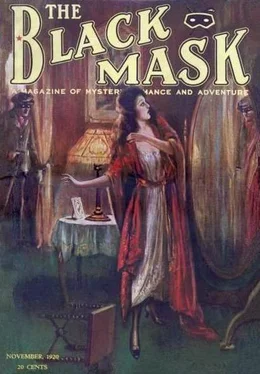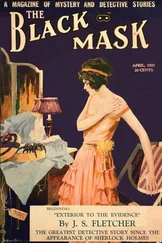Hamilton Craigie - The Black Mask Magazine (Vol. 2, No. 2 — November 1920)
Здесь есть возможность читать онлайн «Hamilton Craigie - The Black Mask Magazine (Vol. 2, No. 2 — November 1920)» весь текст электронной книги совершенно бесплатно (целиком полную версию без сокращений). В некоторых случаях можно слушать аудио, скачать через торрент в формате fb2 и присутствует краткое содержание. Город: New York, Год выпуска: 1920, Издательство: Pro-distributors Publishing Company, Жанр: Классический детектив, на английском языке. Описание произведения, (предисловие) а так же отзывы посетителей доступны на портале библиотеки ЛибКат.
- Название:The Black Mask Magazine (Vol. 2, No. 2 — November 1920)
- Автор:
- Издательство:Pro-distributors Publishing Company
- Жанр:
- Год:1920
- Город:New York
- ISBN:нет данных
- Рейтинг книги:5 / 5. Голосов: 1
-
Избранное:Добавить в избранное
- Отзывы:
-
Ваша оценка:
- 100
- 1
- 2
- 3
- 4
- 5
The Black Mask Magazine (Vol. 2, No. 2 — November 1920): краткое содержание, описание и аннотация
Предлагаем к чтению аннотацию, описание, краткое содержание или предисловие (зависит от того, что написал сам автор книги «The Black Mask Magazine (Vol. 2, No. 2 — November 1920)»). Если вы не нашли необходимую информацию о книге — напишите в комментариях, мы постараемся отыскать её.
The Black Mask Magazine (Vol. 2, No. 2 — November 1920) — читать онлайн бесплатно полную книгу (весь текст) целиком
Ниже представлен текст книги, разбитый по страницам. Система сохранения места последней прочитанной страницы, позволяет с удобством читать онлайн бесплатно книгу «The Black Mask Magazine (Vol. 2, No. 2 — November 1920)», без необходимости каждый раз заново искать на чём Вы остановились. Поставьте закладку, и сможете в любой момент перейти на страницу, на которой закончили чтение.
Интервал:
Закладка:
Peering into the room, he caught the darker hulk of a bed in the gloom. From the arrangement of the bed-clothing it looked as though someone were sprawled on it. But, strain his ears as he might, Bailey could not hear that person breathing.
Moving with the greatest caution, the agent slipped through the door. A gas light, turned very low, was burning. His pistol clutched in his right hand, Bailey stretched out his left, and turned on the gas full blast.
There on the, bed, its head slewed around until the throat-gash yawned like some horrid mouth, lay the body of the man who had been killed on the Marseilles express!
IV
Bailey went cold to the tips of his fingers at the horror of it. He was used to ghastly scenes, but none had ever affected him as did the lonely figure on the disordered bed. If it wasn’t Nash, who was it, and why had he been brought from his slab in the mortuary to this place?
The agent stepped toward the bed, and then a strong hand reached over his shoulder and tore away the pistol. Another was clapped over his mouth. So quickly was the attack made that before Bailey could shout or struggle he was on his back, his own handcuffs on his wrists, and a gag between his teeth.
The apache who had accosted him in the square grinned down at him.
“Ah, vieux cochon,” he snorted, “you are the trapped and not the trapper now. Of course, you understand that we are going to kill you. But first, by order of Monsieur Nash, I am to explain some things to you. He thought it a shame that you should die without first touching the edges of this mystery. Look.”
He walked to the bed, and Bailey’s sidelong glance followed him.
“This man’s name is not unfamiliar to you, monsieur,” said the apache. “It is John Sheppard, known as a cousin to Monsieur the Beau. The resemblance between the two is strong, but you will grant that the make-up is yet the work of a master-hand. The nose, see, it has been filled out with paraffin. The hair and mustache are dyed. This bluish scar at the angle of the jaw has been made with an electric needle.”
Of course, Bailey knew of Johnny Sheppard, who had been almost a% notorious in his sphere as the Beau was in his. It was more than probable that Sheppard had consented to this disguise to throw the police off his cousin’s track. It accounted, anyway, for the widely varying reports of Nash’s whereabouts that had come to the agent’s ears.
The apache continued. “Monsieur Nash intended dispatching you, of course, who is the chief thorn in his side. He was afraid, however, that a more complete examination be made of Sheppard, with the consequent working back of your death to him. We were instructed to get the body. It was absurdly simple. We drew the gendarmes to the front of the prefecture by a false alarm. The mortuary faces on an alley, where we had a covered wagon. You see, it was so easy that even you might have done it.”
Bailey lay very still, hoping that the Frenchman, in his streak of garrulous boasting, might say still more. But the fellow had apparently fulfilled his instructions. He drew his revolver, and looked curiously down at the agent.
“They say Americans know how to die,” he observed casually. “We will see.”
Bill stiffened, but he kept his eyes fixed on the other’s yellow orbs. It was hard to die there, with so much of life before him, but the least he could do was to keep up a bold front. They wanted to see him wince, and he did not intend giving them that satisfaction.
The thug lifted his weapon, and his comrades crowded up, their rat faces glistening. Bailey’s fingers tightened, and his lips drew down in a hard line as he tensed himself for the shock—
A revolver exploded; another followed. Two of the Parisians fell. Their leader plunged for the open, and a huge, gray-haired gendarme deliberately shot him in the back. The apache spun around, and rocketed down the steps, to lie, an unkempt heap, at the bottom.
When Bailey was liberated he dashed downstairs and propped the dying man on his knee. There was much that the fellow could tell him if he would.
“Nom d’un nom!” the apache groaned. “I’m going... To think that a rotten gendarme should get me at last...”
“Who killed Sheppard?” Bailey demanded.
“He paid us... five hundred francs... Zut! Five hundred fraiics, and I haven’t spent a damned sou...”
“Who killed Sheppard?”
The Parisian rolled his pale eyes upward. “Parbleau! I’ll tell. Why not? I got five hundred francs to finish you, and I haven’t spent a centime...” He sat up suddenly. “Be watchful of Bertal,” he gasped; “they are going to kill him.” Then his head sagged back, and he died very Quietly in Bailey’s arms.
“They are going to kill Bertal!” The dead man’s warning rang in Bailey’s ears. What had the man Bertal, whose card had been found in the corpse’s pocket, to do with this affair? Just where did he fit into the distorted mosaic? The agent had known that the presence of Bertal’s card in Sheppard’s pocket could hardly have been due to chance. But he had had no time to investigate any of the little clues he had caught out of the tangled skein. Now his time would be further occupied in preventing some one from exterminating the unhappy Monsieur Bertal.
Bailey rose from his knees to find the gray mustached gendarme regarding him quizzically.
“I have under arrest,” said Sergeant Meaux, “a woman named Denise Girard. We found her on the third floor.”
Bailey’s voice was normal when he asked, “On what charge are you holding her?”
“She has confessed to the murder of the man who was found on the Paris-Marseilles express.”
“Nonsense!” said Bailey violently.
“Perhaps not, monsieur. She is quite positive in expressing herself. And, after all, it would not be the first woman who resorted to murder. It was a wise man who first said, “Cherchez la femme.”
Bailey stood silent, eyes on the ground. It was absurd to believe that his sweet girl had committed so shocking a crime. She had confessed. Bah! What the devil was a confession? Many an innocent person had confessed before this. But ugly doubt reared its head. Why was she so apparently friendly with Beau Nash? Why—
Bailey believed it would be better not to see Denise just then. He wanted time to get a clearer vision of the affair; to make a few investigations. So in company with a gendarme, he hurried into the street, and caught a tram-car in the direction of the Cours Belsunce.
A fog had settled down in earnest, wiping out the tops of the buildings, and making the street lights mere gray smudges in the darkness. He found Monsieur Bertal’s house with difficulty, posted his gendarme outside, and rang the bell.
The Bertal apartment was on the ground floor, as the neat brass plate under the window testified. Monsieur himself opened the door a crack, and looked rather suspiciously at his visitor. Then he bowed, and said:
“Come in, Monsieur Bailey.”
Bailey had not the faintest idea of how Eugene Bertal knew him, but he kept his wonder hidden and he and the gendarme walked in.
Old Bertal might just have stepped from a painting, with his high collar, white shirt front and neck cloth with its pleats and counterpleats. He made Bailey think of English inns, with roaring fire-places and guests thumping in from the lumbering coaches—of fat turkeys, egg nogg, toddy and the rest. In appearance he was a man after Dickens’ own heart—not the pursy French chemical engineer he was supposed to be. The room itself furthered that impression.
There was a huge four-poster bed, with chintz curtains; there was an ancient mahogany bureau, quaint brass candelabra, fine old engravings on the walls, rows of leather bound books. There were also big, helpless looking wadded chairs. The host waved his guest toward one of them.
Читать дальшеИнтервал:
Закладка:
Похожие книги на «The Black Mask Magazine (Vol. 2, No. 2 — November 1920)»
Представляем Вашему вниманию похожие книги на «The Black Mask Magazine (Vol. 2, No. 2 — November 1920)» списком для выбора. Мы отобрали схожую по названию и смыслу литературу в надежде предоставить читателям больше вариантов отыскать новые, интересные, ещё непрочитанные произведения.
Обсуждение, отзывы о книге «The Black Mask Magazine (Vol. 2, No. 2 — November 1920)» и просто собственные мнения читателей. Оставьте ваши комментарии, напишите, что Вы думаете о произведении, его смысле или главных героях. Укажите что конкретно понравилось, а что нет, и почему Вы так считаете.












